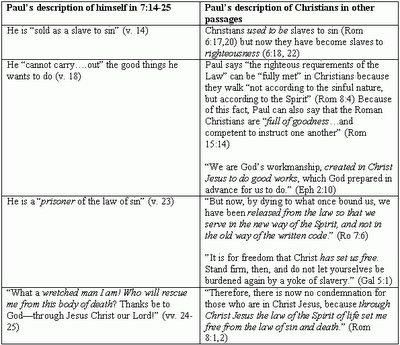14We know that the law is spiritual; but I am unspiritual, sold as a slave to sin. 15I do not understand what I do. For what I want to do I do not do, but what I hate I do. 16And if I do what I do not want to do, I agree that the law is good. 17As it is, it is no longer I myself who do it, but it is sin living in me. 18I know that nothing good lives in me, that is, in my sinful nature. For I have the desire to do what is good, but I cannot carry it out. 19For what I do is not the good I want to do; no, the evil I do not want to do—this I keep on doing. 20Now if I do what I do not want to do, it is no longer I who do it, but it is sin living in me that does it.
21So I find this law at work: When I want to do good, evil is right there with me. 22For in my inner being I delight in God's law; 23but I see another law at work in the members of my body, waging war against the law of my mind and making me a prisoner of the law of sin at work within my members. 24What a wretched man I am! Who will rescue me from this body of death? 25Thanks be to God—through Jesus Christ our Lord! So then, I myself in my mind am a slave to God's law, but in the sinful nature a slave to the law of sin.
Main Points
1. Far from being able to rescue us from our plight, the Law only confirms the spiritual death that sin has brought to us (v. 13).
2. Even the most devoted and faithful Jews cannot fulfill the Law, because they are slaves to their sin. (vv. 14-25)
This conclusion in #2 is not one that every Christian would glean from verses 14 to 25. In the history of the church, right up to today, there have typically been three different interpretations of this passage:
a) The “mature Christian” view. Likely most Christians in the evangelical and Reformed traditions would hold to this. It states that in verses 14 to 25, Paul is referring to himself as he is now, as a mature Christian who still struggles with sin.
b) The “immature Christian” view. This idea states that Paul is referring to himself as a Christian because “he delights in God’s Law in the inner man”, and yet he ultimately feels defeated by the power of sin because he is not living in the power of the Holy Spirit (who, incidentally, is not mentioned until Chapter 8).
c) The “uncoverted Jew” view. This view says that Paul describes himself as he used to be, that is, as a Jew who tried to keep the Law.
I hold to view "c". I do not believe that what Paul says about himself in 7:14-25 can be reconciled at all with what Paul says about Christians in other passages. Look at the chart below (click on it if it's too small to read).

Concerns about the Traditional Interpretation of Rom 7:14-25:
1) While Christians most definitely struggle with sin (Rom 6:11-13; Gal 5:16-17; and Eph 6:10-20) it is a struggle that will most certainly not end in defeat (1 Co 15:55-57; Php 1:6; Heb 13:20-21). However, Rom 7:14-25 suggests such a defeat, particularly in verses 22 to 24.
2) From a practical viewpoint, this interpretation can easily lead to a “throw-up-our-hands” mindset among Christians, where they ask themselves what the point is in seeking to grow in holiness and Christian character, and becoming different people, because they believe they’re incapable of doing so. Indeed, on our own we would be, but we now have the Holy Spirit (Rom 8:1-4; 1 Co 2:12; 2 Co 3:18; Gal 5:16; Php 4:13).
Discussion Questions
1) Which one of the interpretations for Rom 7:14-25 would you hold to? Why?
2) What can all Christians agree on regarding the influence of sin in their lives, even if they should disagree on the meaning of this passage?